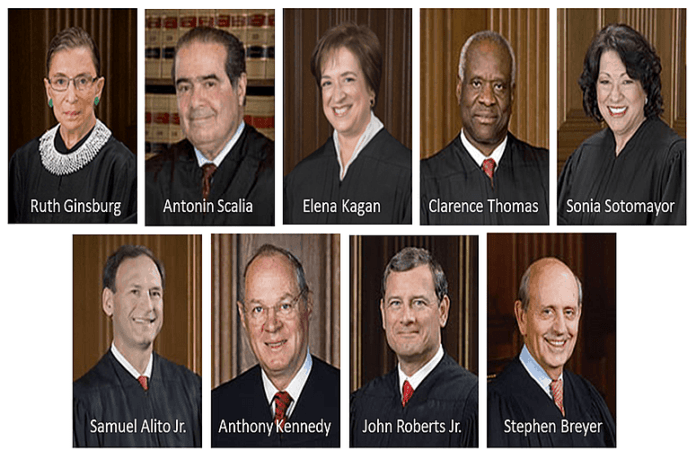The Supreme Court just issued its landmark ruling in Obergefell v. Hodges, holding that the Constitution guarantees a right to same-sex marriage under the Due Process and Equal Protection clauses of the Fourteenth Amendment.
Justice Kennedy delivered the opinion of the Court. He was joined by Justices Ginsberg, Breyer, Sotomayor and Kagan in the 5-4 decision. In his opinion he spoke about the ideal of marriage, as expressed in the laws of the states that were sued– Michigan, Kentucky, Ohio, and Tennessee– all of which define marriage as a union between one man and one woman.
“[T]he petitioners, far from seeking to devalue marriage, seek it for themselves because of their respect—and need—for its privileges and responsibilities,” Kennedy wrote, “as illustrated by the petitioners’ own experiences. . . .
“It would misunderstand these men and women to say they disrespect the idea of marriage,” Justice Kennedy said of the petitioners. “Their plea is that they do respect it, respect it so deeply that they seek to find its fulfillment for themselves. Their hope is not to be condemned to live in loneliness, excluded from one of civilization’s oldest institutions. They ask for equal dignity in the eyes of the law. The Constitution grants them that right.”
Kennedy outlined “Four principles and traditions” that he said demonstrates “that the reasons marriage is fundamental under the Constitution apply with equal force to same-sex couples.”
First, he said, “the right to personal choice regarding marriage is inherent in the concept of individual autonomy. . . . Decisions about marriage are among the most intimate that an individual can make. . . . This is true for all persons, whatever their sexual orientation.
Second, he explained, “[s]ame-sex couples have the same right as opposite-sex couples to enjoy intimate association, a right extending beyond mere freedom from laws making same-sex intimacy a criminal offense.
Third, “the right to marry . . . safeguards children and families and thus draws meaning from related rights of childrearing, procreation, and education. . . . Without the recognition, stability, and predictability marriage offers, children suffer the stigma of knowing their families are somehow lesser. They also suffer the significant material costs of being raised by unmarried parents, relegated to a more difficult and uncertain family life. The marriage laws at issue thus harm and humiliate the children of same-sex couples.
Fourth, he said, “this Court’s cases and the Nation’s traditions make clear that marriage is a keystone of the Nation’s social order. . . . There is no difference between same- and opposite-sex couples with respect to this principle, yet same-sex couples are denied the constellation of benefits that the States have linked to marriage and are consigned to an instability many opposite-sex couples would find intolerable. . . . The limitation of marriage to opposite-sex couples may long have seemed natural and just, but its inconsistency with the central meaning of the fundamental right to marry is now manifest.
Justices Roberts, Scalia, Thomas, and Alito all filed dissenting opinions.
Justice Roberts’ response was sarcastically aimed at the majority opinion.:
“If you are among the many Americans — of whatever sexual orientation — who favor expanding same-sex marriage, by all means celebrate today’s decision. Celebrate the achievement of a desired goal. Celebrate the opportunity for a new expression of commitment to a partner. Celebrate the availability of new benefits. But do not celebrate the Constitution. It had nothing to do with it.”
To read the decision in its entirety, click obergefell-v-hodges.



